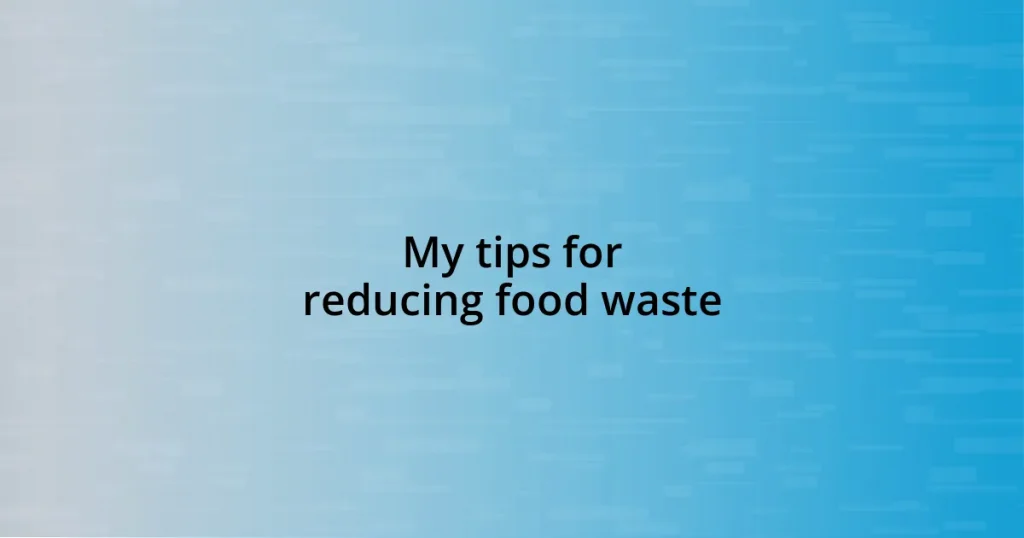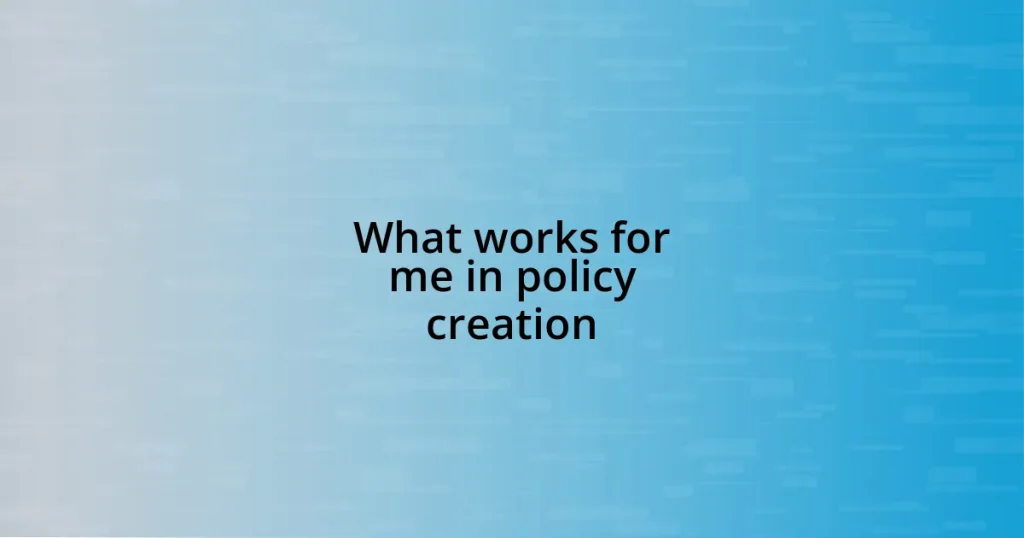Key takeaways:
- Food waste accounts for up to one-third of global food production, contributing to environmental issues and food insecurity.
- Reducing food waste leads to financial savings, enhanced food security, and increased awareness of food’s value.
- Effective grocery shopping strategies like meal planning, understanding store layouts, and bulk buying can significantly minimize waste.
- Repurposing leftovers creatively and engaging in composting can transform waste into valuable resources while fostering community connections.
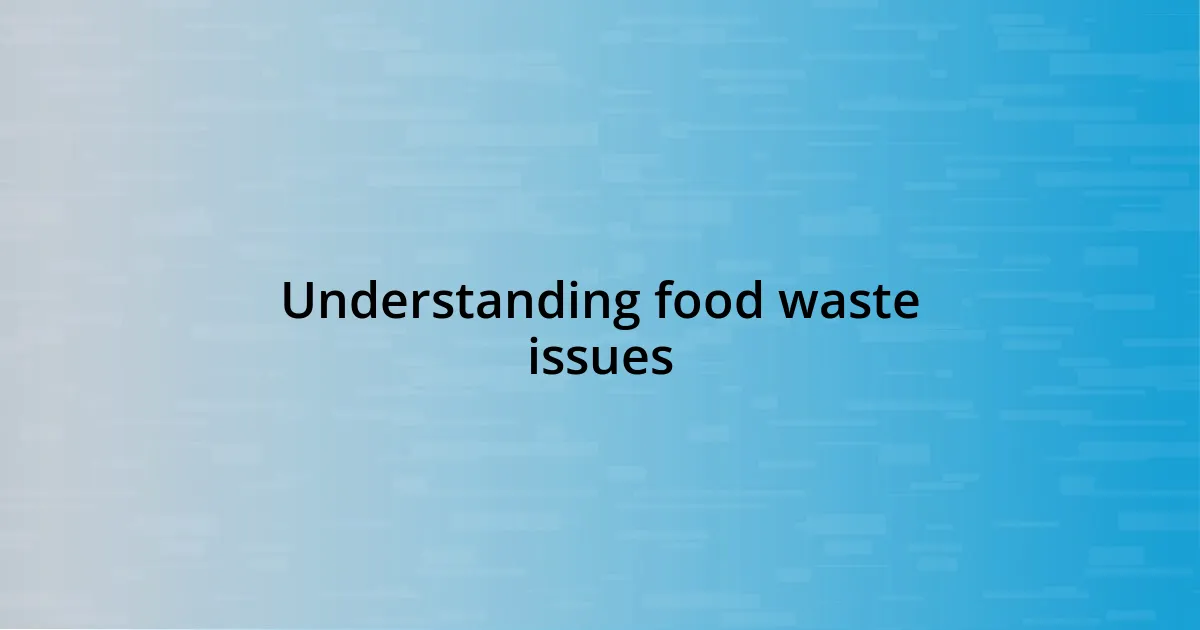
Understanding food waste issues
Food waste is a pressing issue that deeply resonates with me, especially considering that up to one-third of all food produced globally ends up in landfills. It’s disheartening to think about the resources—like water, labor, and energy—that go into growing and transporting that food, only for it to be discarded. Have you ever opened your fridge to find expired items that you had intended to use? I know I have, and it’s a frustrating reminder of just how easily we forget about what’s in our own kitchens.
The emotional connection we have with food cannot be overlooked, either. Each meal carries memories and moments, yet so much is wasted without a second thought. Personally, I remember sharing a hearty meal with friends and feeling a sense of abundance. It struck me that while we enjoyed our feast, countless others were going without. What if we shifted our perception of food, viewing it as a precious resource rather than a disposable commodity?
Understanding the broader implications of food waste is crucial. Not only does it contribute to greenhouse gas emissions, but it also exacerbates food insecurity. Each time I read about families struggling to afford meals, I can’t help but think of all the perfectly good food that gets thrown away. How can we reconcile these two realities—a world where food is wasted and another where it is desperately needed? It’s a challenge we all share.
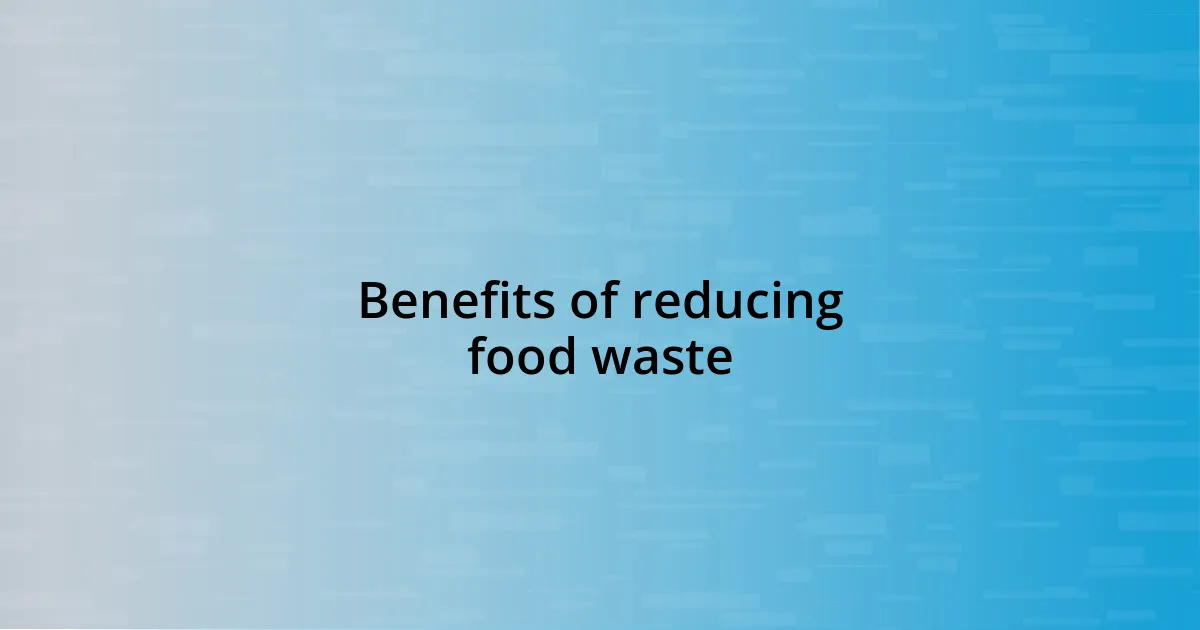
Benefits of reducing food waste
Reducing food waste offers a wealth of benefits that reach far beyond our kitchens. For instance, when I began taking steps to minimize waste, I noticed not only a boost in my budget but also a newfound creativity in meal planning. The challenge of using everything I purchased turned cooking into an exciting adventure, where I adapted recipes based on what I had at hand rather than relying on a long shopping list. It’s amazing how a little effort can lead to both satisfaction and financial savings.
Here are some more advantages that can come from reducing food waste:
- Environmental impact: Less food in landfills means fewer greenhouse gas emissions and less strain on our climate.
- Financial savings: Lower grocery bills as I make better use of what I buy.
- Enhanced food security: By wasting less, we contribute to a system where scarce resources are more evenly distributed, making it easier for those in need to access food.
- Increased awareness: Each meal becomes an opportunity to reflect on the value of food, fostering a deeper appreciation for what we eat.
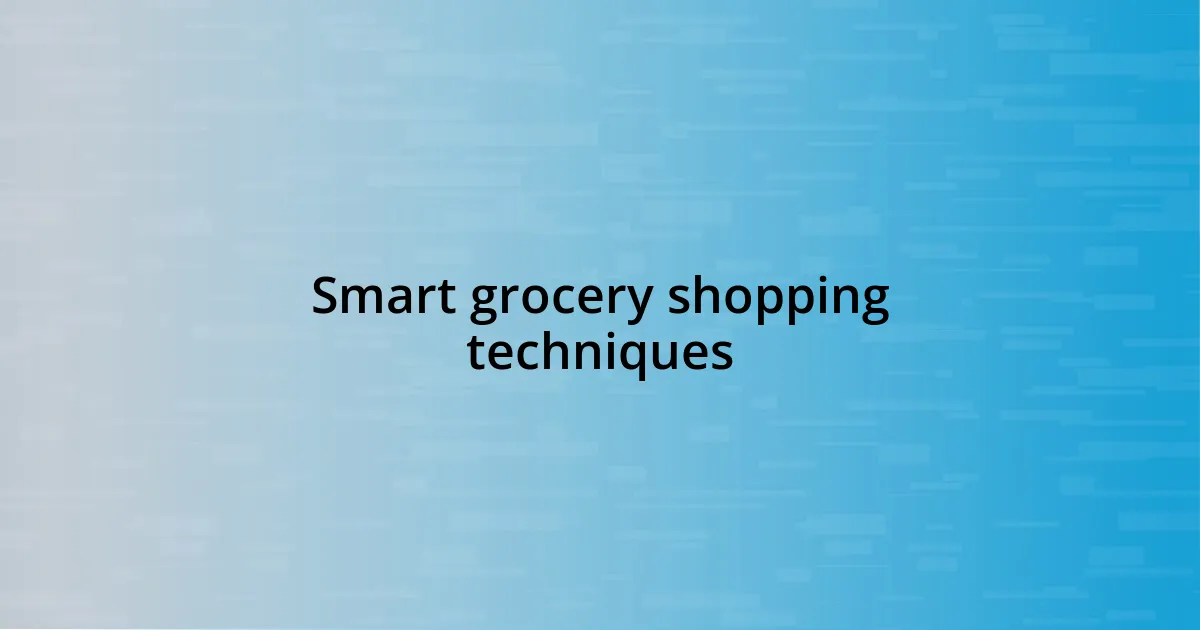
Smart grocery shopping techniques
When I step into a grocery store, I’ve learned that having a plan is half the battle. I always make sure to go in with a shopping list based on my meal plans for the week. This practice not only helps prevent impulse buys but also ensures that I purchase just what I need. It’s a simple yet effective technique that keeps my kitchen organized and reduces the likelihood of food spoilage.
Another approach I’ve found beneficial is understanding the layout of the store. Most grocery stores place fresh produce and healthier options at the entrance, while processed items tend to linger in the aisles. I prioritize visiting the fresh produce section first, loading my cart with seasonal fruits and vegetables that not only taste better but also have a longer shelf life. This tactic helps me create meals centered on fresh ingredients, significantly reducing waste.
Moreover, I’ve discovered that buying in bulk can be a smart choice when done carefully. For items that I know I’ll use frequently—like rice, pasta, or dried beans—I buy in larger quantities. However, I always make sure to understand what I can realistically consume before it spoils. This way, I stock up without the fear of wasting food, effectively balancing convenience and sustainability.
| Smart Grocery Strategy | Benefit |
|---|---|
| Meal Planning | Reduces impulse buys and minimizes food waste. |
| Store Layout Awareness | Encourages healthier, fresh ingredient choices. |
| Bulk Buying | Cost-effective for non-perishable items; reduces frequent trips. |
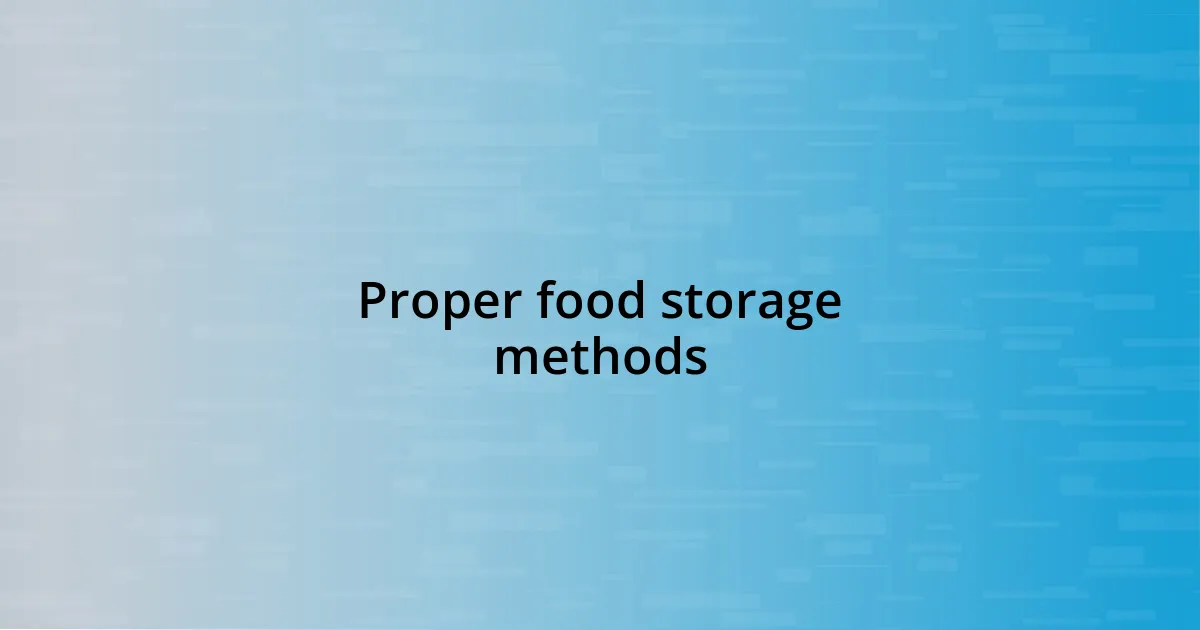
Proper food storage methods
There’s something satisfying about knowing how to store food properly. I remember the time I discovered that wrapping herbs in a damp paper towel and placing them in a sealed bag kept them fresh for weeks. It was like finding a hidden gem! Now, I can enjoy fresh basil or cilantro without that guilty feeling of watching them wilt away.
When it comes to fruits and vegetables, I learned that some need their own space. For example, I often separate my apples from other fruits to prevent them from ripening too quickly. It amazed me how a simple adjustment in storage techniques could extend the life of my produce significantly. Have you ever tasted a perfectly ripe pear a week later? You might just want to try!
I can’t emphasize enough the importance of temperature regulation in my fridge. I noticed that placing dairy products on the middle shelves rather than the door not only keeps them colder but also maintains their freshness longer. It’s little tweaks like these that make me feel in control of my kitchen—and they help me keep waste to a minimum. Don’t you just love knowing you’ve maximized every bite?
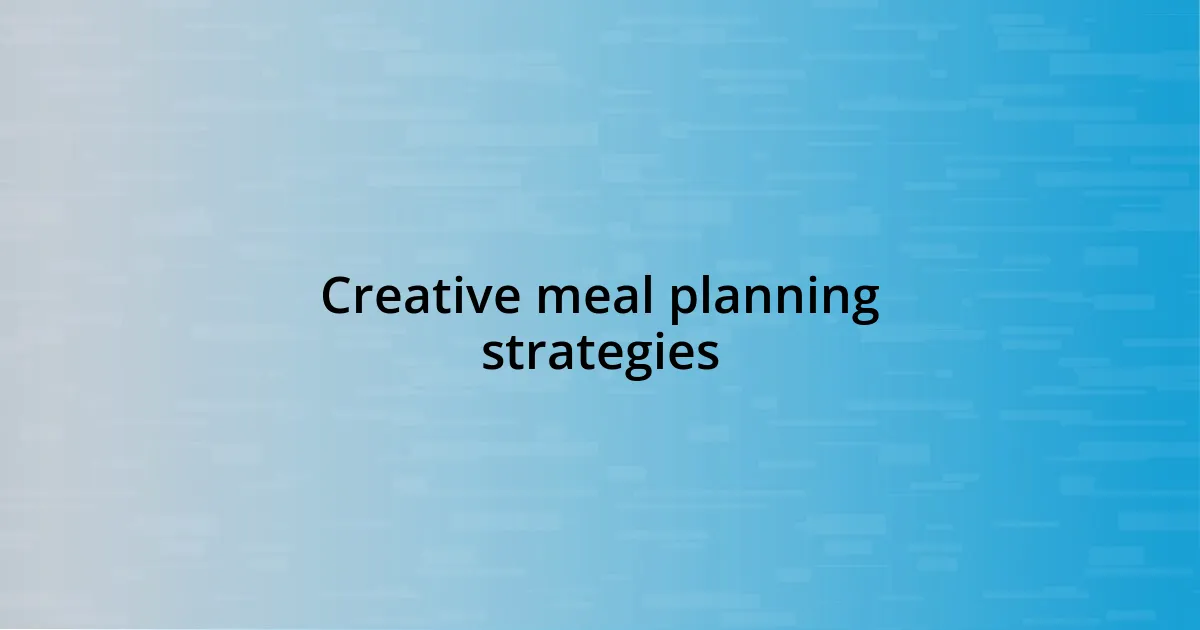
Creative meal planning strategies
Creatively planning meals has transformed my approach to cooking and significantly reduced food waste in my home. One method I use is establishing themed nights, like Taco Tuesday or Meatless Monday. This way, I can maintain a bit of excitement in the kitchen while ensuring that I incorporate similar ingredients throughout the week. I remember the joy of making a big pot of chili on Monday, then using the leftovers creatively for tacos the next night—it felt both resourceful and delightful!
I also find it incredibly helpful to explore “inventory meals.” Before I go grocery shopping, I take stock of what I already have. This practice often sparks creativity. Last week, for instance, I noticed half a can of coconut milk and some spinach in my fridge. I ended up whipping up a delicious curry! It’s amazing how much fun you can have while using what’s on hand—plus, it helps in avoiding that guilty feeling of tossing expired ingredients.
Utilizing leftovers is another clever strategy I’ve adopted. I recently experimented with repurposing roasted vegetables from dinner into a hearty breakfast frittata. The satisfaction I felt when the frittata turned out perfectly golden and delicious was unmatched! Have you ever tried transforming your leftovers into something new? It’s these small innovations that not only ignite passion in the kitchen but also play a huge role in minimizing waste—it’s a win-win!
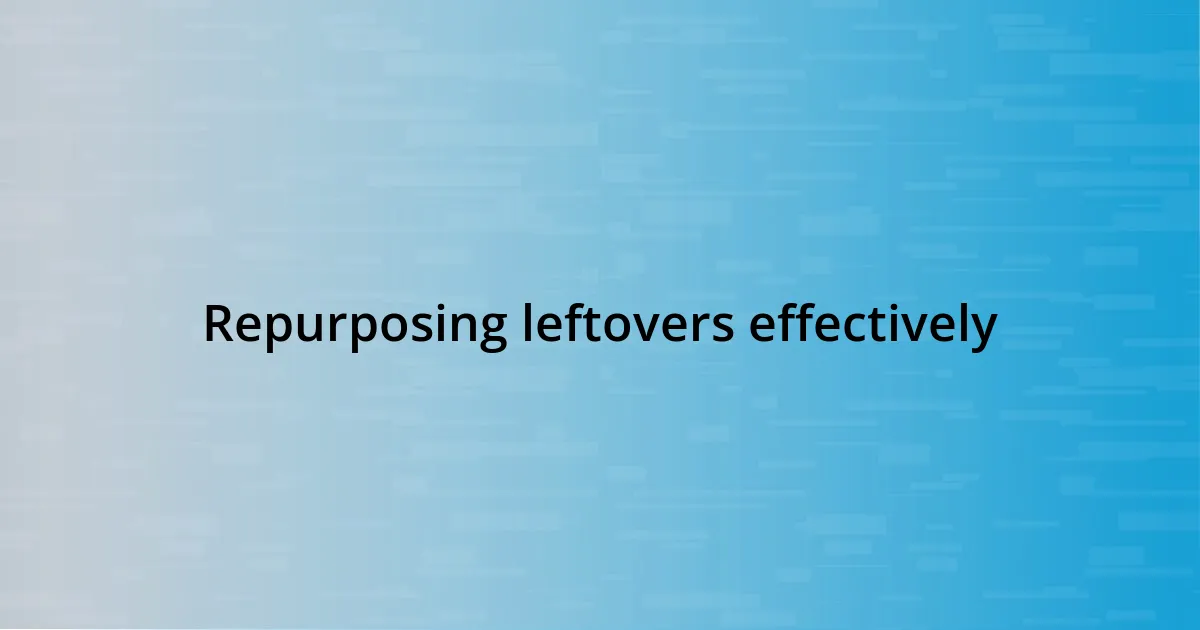
Repurposing leftovers effectively
When it comes to transforming leftovers, I love getting creative with what I have on hand. Just the other day, I seasoned some leftover roasted potatoes with spices and turned them into a mouthwatering potato salad. It was a simple twist, but it made me realize how versatile leftovers can be. Have you ever thought about how much potential those scraps hold?
One of my favorite ways to repurpose leftovers is by crafting homemade soups. I can’t tell you how many times I’ve thrown together a quick broth using bits of vegetables, old bread for croutons, and some herbs. There’s something so heartwarming about sipping a warm bowl of soup that you know is not only delicious but also saving you from waste. It reminds me of my grandmother, who would always insist that nothing should go to waste, teaching me that good food can come from unexpected combinations.
I also find myself getting experimental with baking. For instance, I recently had some overripe bananas that I didn’t want to toss. I combined them into a batch of banana bread, adding a handful of chocolate chips for an indulgent touch. The smell wafting through my kitchen was pure bliss! It’s these small feats of resourcefulness that not only reduce waste but also make me feel accomplished in the kitchen—who knew leftovers could spark such joy?
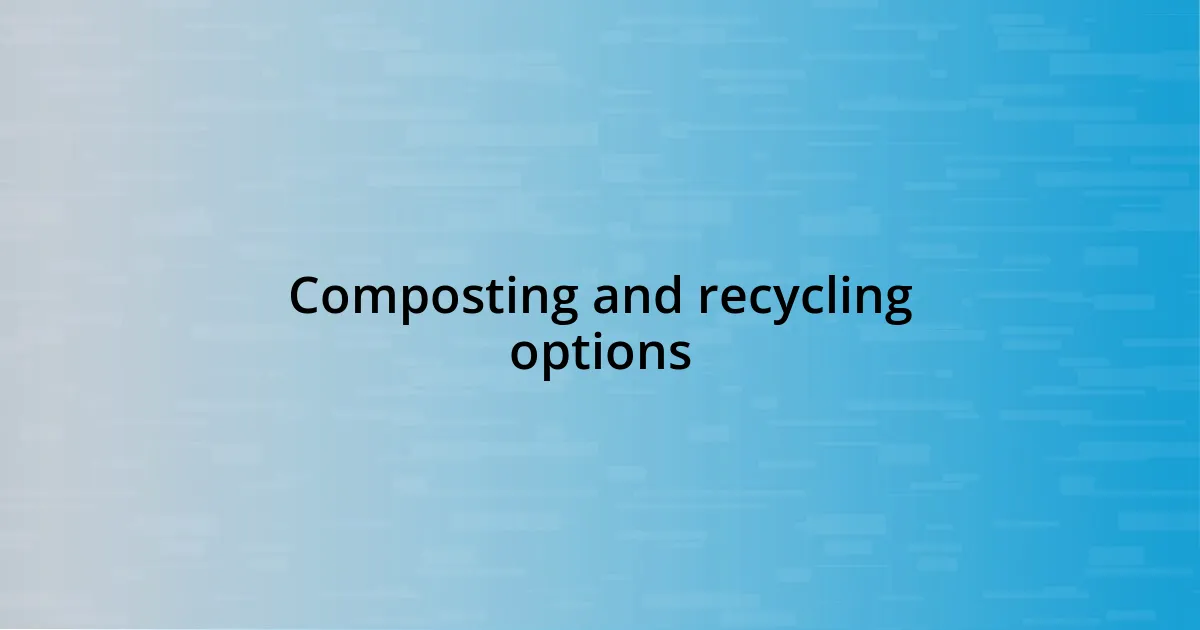
Composting and recycling options
Composting has become a vital part of my kitchen routine, and I often reflect on how it transforms food scraps into rich, nourishing soil. For instance, last month, I started a simple compost bin in my backyard, using vegetable peels, coffee grounds, and even eggshells. The first time I dug into the compost and found dark, crumbly soil was incredibly rewarding—it felt like turning my waste into something valuable.
When considering recycling options, I’ve realized how crucial it is to check local guidelines. Not all food packaging can be recycled, and I remember feeling frustrated when I discovered this after tossing a box of frozen veggies into the recycling bin. So now, I’m diligent about rinsing out containers and separating materials like plastic and glass, knowing that these little actions contribute to a bigger impact. Have you ever felt that satisfaction from taking the time to recycle properly?
Additionally, I’ve been pleasantly surprised by the community composting programs available in my area. Just the other week, I dropped off a bag of apple cores and carrot tops at a local community garden. Knowing that my scraps would be transformed into compost to nourish new plants gave me a sense of connection to my community. It’s moments like these that remind me that reducing waste isn’t just about the individual; it’s about working together for a healthier planet.











